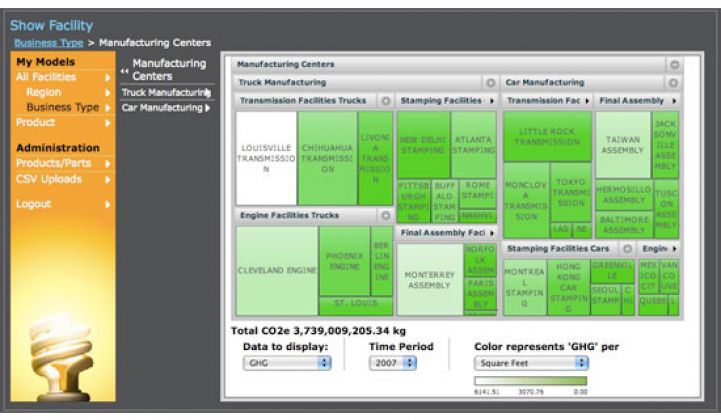Planet Metrics emerged from stealth mode Tuesday with news that it has raised $2.3 million in funding and has lined up customers for its carbon emissions management software.
The San Francisco startup, founded in early 2007 by Andy Leventhal and Aaron Dallek, has developed software for modeling and visualizing emissions from different segments of a business operation, such as harvesting and transporting raw materials, packaging and distributing products and waste disposal.
Planet Metrics' customers can compare analyses from its software with emissions data from scientific and government organizations worldwide, including Carnegie Mellon University. The university boasts 15 years worth of economic and carbon emissions modeling data. Businesses can then use these models to develop plans for curbing greenhouse gas emissions.
While the crashing economy is bad news for many startups, Leventhal believes it might actually benefit Planet Metrics. Many companies' interest in managing carbon emissions goes beyond complying with laws or presenting an environmentally friendly image, he said. Understanding energy use also will help a business find ways to save money.
"Business sustainability is about efficiencies. With all these rising costs, they have to figure out how to do more with less," said Leventhanl, who led the strategic alliances and business development team for Red Hat and was employee No. 5 at VeriSign. "Some people who are still looking at green initiatives will be in trouble. They need to figure out how to cut costs and source better and package better and transport better and run buildings more efficiently."
The startup is counting the Consumer Electronics Association as among "a handful" of customers, Leventhal said, who declined to disclose the names of other customers. The CEA, which runs the annual mega show that attracts roughly 130,000 attendees to Las Vegas every January, began collecting data and running analyses of its 2009 show several months ago.
Angel investors and Draper Fisher Jurvetson provided the $2.3 million, Series A round for Planet Metrics.
Planet Metrics joins a growing number of software developers targeting companies that aim to reduce their carbon footprint. One competitor is Canada-based Carbonetworks, which raised a $5 million, Series A round earlier this year. Other players include Verisae and IBM.
A number of companies also are developing carbon-tracking software for consumers and governments. Last year, Bill Clinton's foundation and Microsoft said they would work together to develop software for cities to measure and manage their greenhouse gas emissions.
Leventhal said many competitors' products are merely tracking and reporting emissions. Planet Metrics' software, on the other hand, provides detailed modeling and analyses of different parts of an operation, he said.
Businesses in a wide-range of sectors are increasingly putting in money and time to track their emissions and figure out ways to cut them. In the past, they do so largely to obey laws by governments that have set emissions reduction goals.
Europe deployed a program in 2003 to allow companies that can't meet emissions requirements to buy credits from those who can. Many countries see the carbon cap-and-trade program a good way to force polluters to use new technologies or other means to cut emissions. But its effectiveness is under debate.
There is no national carbon cap-and-trade program in the United States, although president-elect Barack Obama supports creating one. The Regional Greenhouse Gas Initiative, which is made up of 10 northeastern states, is the first government-regulated program. The RGGI held its first carbon permits auction in September (see RGGI Generates $38.58M in Carbon Permit Sale).
Another regional effort, called the Western Climate Initiative, is under development by seven western states and four Canadian provinces. The initiative is devising a cap-and-trade program that aims to reduce greenhouse gas emissions to 15 percent below the 2005 levels by 2020 (see U.S. Congress Reconsiders Credits While Carbon Auctions Launches).
Planet Metrics will focus on the U.S. market for now, Leventhal said. Customers will pay for the software subscription and services to run the modeling and visualization software and interpret the results. The cost to each customer will depend on the amount of data to be analyzed, but in general it will range from $25,000 to $75,000 for using the current, beta program.
In the future, Planet Metrics would like to enhance its offerings so companies can measure more than just greenhouse gas emissions. In fact, measuring emissions won't be as lucrative as gauging how other environmental factors can severely impact a business, Leventhal said.
"People want to measure other things besides carbon. Right now carbon is a low-hanging fruit," Leventhal said. "Water is very important – it's a not a renewable resource. And people are concerned about the toxicity of materials."



